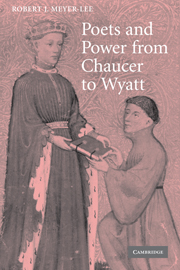Epilogue: Sir Thomas Wyatt: Anti-laureate
Published online by Cambridge University Press: 27 October 2009
Summary
At various moments throughout this book, I have gestured toward Spenser as a latter-day Lydgatean, and hence a natural conclusion would be to revisit this gesture and, in particular, to consider the ways in which Spenser refashions laureate poetics to suit his specific circumstances and, more generally, ushers it into early modernity. Yet, such a consideration, done thoroughly, bespeaks not so much a terminus for this project as the beginning of a new one, and hence, for practical reasons, cannot be pursued here. Moreover, there are pressing literary historical reasons to focus this epilogue elsewhere – ones that are strikingly evident in the opening of E. K.'s Epistle in The Shepheardes Calender (1579), in which E. K. celebrates Chaucer as “the olde famous Poete,” the onomastic twin of Virgil in their shared cognomen Tityrus, while he mentions Lydgate merely as Chaucer's admiring “scholler.” Similarly, in the first gloss to Januarye, E. K. acknowledges Skelton's coinage of the pseudonym “Colin Cloute” but, in identifying Spenser's source, quickly passes over the English laureate in favor of Clément Marot. In the fifty years that had elapsed between Skelton's death and Spenser's publication of The Shepheardes Calender, Tudor poets had learned to publicize their origins as occurring anywhere but in fifteenth-century England. In fact, this general suppression happened rather suddenly, decades before Spenser's birth, in the very court in which Skelton practiced his trade.
- Type
- Chapter
- Information
- Poets and Power from Chaucer to Wyatt , pp. 220 - 232Publisher: Cambridge University PressPrint publication year: 2007



